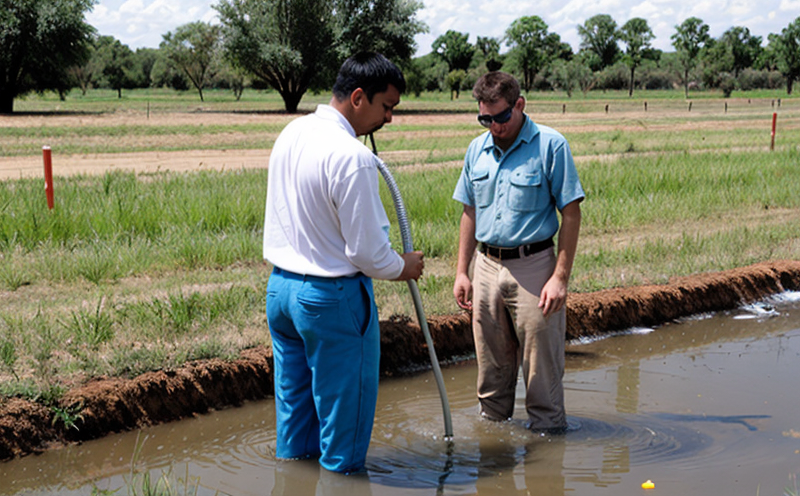ASTM D1179 Fluoride Determination Test in Groundwater
The ASTM D1179 test method is a widely recognized standard for the determination of fluoride in groundwater samples. This method is essential for ensuring compliance with environmental regulations and safeguarding public health, particularly when dealing with water sources that may contain elevated levels of fluoride.
Fluoride, while beneficial at low concentrations, can be toxic to humans if present in excessive amounts. The World Health Organization (WHO) recommends a maximum limit of 1 mg/L for drinking water, emphasizing the importance of accurate and reliable testing methods like ASTM D1179.
The ASTM D1179 test is designed to measure fluoride ions using an ion-selective electrode (ISE). This method provides precise results by eliminating interference from other ions present in groundwater. The procedure involves several critical steps, including sample collection, filtration, and acidification. Proper specimen preparation ensures accurate readings, which is crucial for regulatory compliance.
Once the samples are prepared, they are analyzed using a pH meter equipped with an ISE probe specifically calibrated for fluoride ions. This setup allows for real-time monitoring of fluoride concentrations as the sample is titrated with potassium chloride (KCl) solution to neutralize other interfering ions. The endpoint of this titration process provides the fluoride concentration in parts per million (ppm).
The accuracy and precision of ASTM D1179 are ensured by rigorous calibration procedures and quality control measures. Laboratories adhering to this standard must regularly calibrate their equipment and validate results against certified reference materials.
Compliance with ASTM D1179 is not only important for meeting regulatory requirements but also for protecting public health and the environment. Drinking water contaminated with excessive fluoride can lead to conditions such as fluorosis, which affects bone structure and teeth. By employing this test method, laboratories play a vital role in maintaining safe drinking water standards.
The ASTM D1179 procedure is applicable not only to drinking water but also to other groundwater sources used for various industrial processes or agricultural irrigation. The ability to accurately determine fluoride levels ensures that these water sources meet the necessary safety and regulatory criteria, thereby protecting both human health and environmental integrity.
Industry Applications
The ASTM D1179 test method finds extensive application across multiple sectors where groundwater quality is a critical concern. In the drinking water industry, this test ensures that tap water meets safety standards set by regulatory bodies such as the EPA in the United States and the WHO.
For industrial users of groundwater, ASTM D1179 helps in identifying potential contamination issues early on, allowing for corrective actions to be taken promptly. This is particularly important in sectors like agriculture, where excessive fluoride levels can affect crop quality and yield.
In environmental monitoring projects, the test method provides valuable data that aids in understanding groundwater pollution trends over time. This information is crucial for developing effective mitigation strategies and policies aimed at reducing fluoride contamination in water sources.
Customer Impact and Satisfaction
Adopting ASTM D1179 ensures that customers receive accurate, reliable, and consistent results, fostering trust and satisfaction. For regulatory bodies and governments, adherence to this standard facilitates compliance with international standards like ISO and EPA guidelines.
Customers in the healthcare sector benefit from the peace of mind knowing that the water they use meets stringent safety criteria. This is especially important for hospitals and clinics where potable water quality directly impacts patient care.
In industrial settings, compliance with ASTM D1179 helps prevent costly shutdowns due to non-compliance issues. It also enhances a company’s reputation by demonstrating its commitment to environmental stewardship and public health.
Environmental and Sustainability Contributions
The ASTM D1179 test method contributes significantly to environmental protection by helping prevent fluoride contamination of groundwater. By accurately measuring fluoride levels, laboratories can identify potential sources of pollution early on, enabling timely interventions.
This standard supports sustainability efforts by promoting the use of safe and clean water resources for all sectors. It helps in reducing the environmental footprint associated with contaminated water usage, thereby supporting broader sustainability goals.
By ensuring that groundwater is free from excessive fluoride, ASTM D1179 contributes to healthier ecosystems and more resilient communities. This aligns with global initiatives aimed at improving water quality worldwide and promoting sustainable development.





